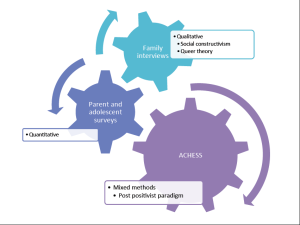It may appear to the outsider that the world of health research consists of a homogenous collective of nerdy academics crunching numbers in an attempt to answer scientifically important questions. But for those of us living in that world there sometimes arises occasions that throw into stark relief the contrasting dynamics at play amongst our own peers.
Source: thebillproject.org
This realisation came to the fore this week during the formalities of the annual Royal Australasian College of Physicians Victoria Trainee Research Awards. I was lucky enough to have my abstract, which recounts my research on child health in same-sex families, selected to present in the Paediatric division. I had made the somewhat bold decision to present the entirety of my PhD in the very strict 12 minute time restriction, but having twice competed in the 3 Minute Thesis competition 12 minutes seemed like a luxury!
On arrival I flicked through the program for the evening and straight away knew it would be an interesting night. My sole-author paper immediately contrasted with all the other abstracts which contained lists of authors as long as your arm. They were jam packed with p values and confidence intervals and had long complex words like sarco-osteoporosis or bamboozling molecular markers such as FLT-3. I was entering a room full of clinicians and lab-based researchers who knew that black is black and white is white. My mixed methods approach, drawing heavily on the social sciences, allowed black to be lava grey and white to be antique cream. It was going to blow some minds.
The presentation itself went well. I kept to time and handled the slightly predictable questions comfortably: “aren’t the parents better educated and earn more money”; “but don’t all children have to deal with bullying of some sort”. As the marks for each presentation were collated a panel discussion on ‘advanced training and research’ re-emphasised the focus on clinical work. One participant even suggested that being a clinician made you a better researcher and that good researchers do better clinical work. It’s over 5 years since I’ve seen a real patient!
In this clinical world it was a little surprising therefore that I discovered I had won the Paediatric prize. It may have been somewhat of a euphemistic win (if such a thing is possible) as the comments included: “weren’t your slides pretty” and “good on you for having the guts to use a different methodology.” Perhaps throwing words like post-positivism, social constructivism, queer theory and heteronormativity out at the audience did the job of impressing and confusing in equal measure. Putting all modesty aside it is more likely that the judges recognised the originality of my research and the efforts required to pull together the tricky mixed methods that I had had the ‘guts’ to use.
While I am proud of the award, and proud that the college was able to recognise my work, I was reminded that there is a huge gulf between the more social perspectives of health, and public health in general, and the way in which many clinicians often think. As I continue my research, drawing on the social determinants of health, this illuminating night acts as an important reminder that we need to continually engage with our clinical partners to ensure that all the multidimensional aspects of health and wellbeing are brought to bear in our efforts to improve the health of the whole population.
I would like to thank Elizabeth Waters and Ruth McNair who have supervised my research, the Advisory Committee who allowed the development of a robust mixed methods framework and the whole of the Jack Brockhoff Child Health and Wellbeing Program for their advice and support.
Dr Simon Crouch, Honorary Research Fellow and Lead Investigator, The Australian Study of Child Health in Same-Sex Families



Pingback: Kardashians, Kin, and Foreskins: a radical reframing of child health in same-sex families. | Research Connect